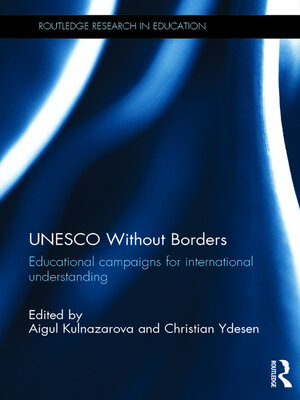UNESCO Without Borders
ebook ∣ Educational campaigns for international understanding · Routledge Research in Education Policy and Politics
By Aigul Kulnazarova

Sign up to save your library
With an OverDrive account, you can save your favorite libraries for at-a-glance information about availability. Find out more about OverDrive accounts.
Find this title in Libby, the library reading app by OverDrive.



Search for a digital library with this title
Title found at these libraries:
| Library Name | Distance |
|---|---|
| Loading... |
The United Nations Educational, Scientific, and Cultural Organization (UNESCO) was established in 1945 with twin aims: to rebuild various institutions of the world destroyed by war, and to promote international understanding and peaceful cooperation among nations. Based on empirical and historical research and with a particular focus on history teaching, international understanding and peace, UNESCO Without Borders offers a new research trajectory for understanding the roles played by UNESCO and other international organizations, as well as the effects of globalization on education.
With fifteen chapters by authors from cross-disciplinary and diverse geographical areas, this book assesses the global implications and results of UNESCO's educational policies and practices. It explores how UNESCO-approved guidelines of textbook revisions and peace initiatives were implemented in member-states, illustrating the existence of both national confrontations with the new worldview promoted by UNESCO, as well as the constraints of international cooperation.
This book provides an insightful analysis of UNESCO's past challenges and also indicates promising future research directions in support of international understanding for peace and cooperation. As such, it will be of key interest to researchers, postgraduate students, academics in the fields of international and comparative education, education politics and policies, and to those interested in the historical study of international organizations and their global impact. The book will also appeal to practitioners, especially those who conduct research on or work in post-conflict societies.







